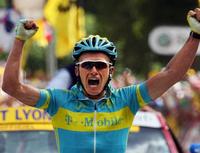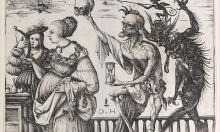Cycling suffers thousand doping cuts

If you’re an optimist you would say that cycling is in such a deep black hole of scandal that soon thing must get better.
Perhaps.
One main reason why the once revered Tour de France is in such agony, suffering a thousand cuts from doping, is that the sport failed to fully heed the lessons from previous drug scandals in 1998 and as recently as last year.
Time to save cycling may now be running out. Should the Tour, a 104-year-old institution, be stopped? Should cycling be de-listed as an Olympic sport? That such questions are now being asked shows how desperate the situation has become.
For once, apportioning blame is valid, perhaps even a necessary step if credibility is going to be restored.
Cycling's governing body, the UCI, has proved a poor custodian, failing to stop the doping rot that has been evident for years. It has toughened up this year, with a more rigorous program of testing and a less apologetic approach. Is it still too little, too late?
And despite their tough anti-doping talk, Tour organizers gave a wild-card invite to Alexandre Vinokourov's Astana team. That proved a massive mistake. Vinokourov and Astana were pulled from the race on Tuesday after he tested positive for a banned blood transfusion.
A long-running battle between the UCI and the organizers of the Tour, cycling's showpiece, about how the sport should be organized has further poisoned the atmosphere and distracted from what should have been priorities one, two and three: Weeding out cheats.
Had the UCI made it known weeks ago that Michael Rasmussen had missed random drug tests on May 8 and June 28, then he most likely would not have been at the Tour's joyous start in London on July 7, when massive crowds lined the streets.
Contrast those scenes with the boos that fans directed at the Dane on Wednesday - his last day of racing before he was sent home for lying to his team about his whereabouts in those crucial weeks when drug-testers were hunting for him.
Unfortunately for the Tour and for riders - some, perhaps most, of them clean - who trailed in his wake, Rasmussen had already been wearing the race leader's hallowed yellow jersey for eight days by time he was told to pack his bags.
Fans have a right to be disappointed. But they also need to ask themselves if they have been part of the problem. Many have long suspected that their heroes were or had doped - but still turned out en masse to cheer them on.
Some reporters have been complicit, too, asking riders softball questions like "why are you wearing black socks?" and not, "how can you honestly expect us to believe that your superhuman performances are accomplished without drugs?"
To be fair, asking such questions is often tough: Even at this tainted Tour, some riders and team officials have continued to refuse point-blank to speak about anything other than "the race."
For the media to turn its back on the Tour - as German public broadcasters and a big Swiss daily have done - would be a sad outcome. It shouldn't be forgotten that the Tour used be a great race that has sold countless newspapers, gratified sponsors and inspired generations.
Perhaps cycling should learn from South Africa, and hold truth and reconciliation hearings to allow riders, managers and sponsors to 'fess up. Air that dirty laundry before working out how to move on.
Ultimately, the fight against doping resembles the Tour itself, a long and arduous struggle with many ups and downs.
If riders and cycling managers are made to realize that "zero tolerance" means exactly that, perhaps there is hope. But perhaps cheating is inevitable in any sport, a reflection of wider human frailties that can at best be managed, not eradicated.
As Tour director Christian Prudhomme was quoted as saying this week: "If there was a sack race at the Olympic Games, with prize money and which was televised, there would be people cheating for that."
Subscribe to Pravda.Ru Telegram channel, Facebook, RSS!




